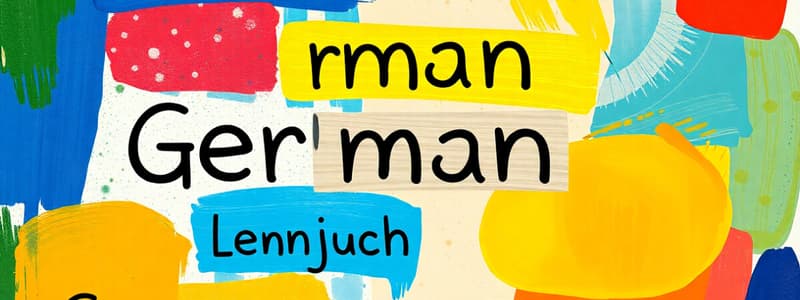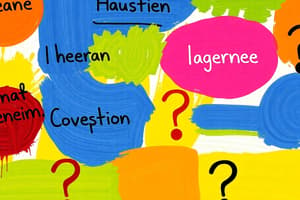Podcast
Questions and Answers
Welches ist eine formelle Begrüßung, die oft in Anschreiben verwendet wird?
Welches ist eine formelle Begrüßung, die oft in Anschreiben verwendet wird?
- Freut mich, Sie kennenzulernen!
- Hey
- Sehr geehrte/r [Name] (correct)
- Hallo
Welche der folgenden Begrüßungen ist informell?
Welche der folgenden Begrüßungen ist informell?
- Tschüss (correct)
- Grüß Gott!
- Guten Abend
- Auf Wiedersehen
Was bedeutet die Begrüßung 'Wie geht's?'?
Was bedeutet die Begrüßung 'Wie geht's?'?
- Nice to meet you
- Good night
- How are you? (correct)
- Goodbye
Welche Verabschiedung ist formell und eignet sich gut für den Abend?
Welche Verabschiedung ist formell und eignet sich gut für den Abend?
Welche Aussage ist richtig für eine Begrüßung bei einer ersten Begegnung?
Welche Aussage ist richtig für eine Begrüßung bei einer ersten Begegnung?
Was ist eine informelle Verabschiedung?
Was ist eine informelle Verabschiedung?
Welches ist keine formelle Verabschiedung?
Welches ist keine formelle Verabschiedung?
Welche der folgenden Begrüßungen wird häufig im süddeutschen Raum verwendet?
Welche der folgenden Begrüßungen wird häufig im süddeutschen Raum verwendet?
Welche Begrüßung ist geeignet, wenn Sie jemanden schon einmal getroffen haben?
Welche Begrüßung ist geeignet, wenn Sie jemanden schon einmal getroffen haben?
Was ist ein weniger formelles Wort für 'Hallo'?
Was ist ein weniger formelles Wort für 'Hallo'?
在商务会议中,哪种问候语最为合适?
在商务会议中,哪种问候语最为合适?
当与新认识的人进行正式介绍时,适当的表达是什么?
当与新认识的人进行正式介绍时,适当的表达是什么?
哪种情况下应使用非正式的告别方式?
哪种情况下应使用非正式的告别方式?
哪一种是适当的告别电话语?
哪一种是适当的告别电话语?
如何在社交场合中以非语言方式支持问候?
如何在社交场合中以非语言方式支持问候?
使用‘Danke’表示感谢的情境最合适是哪一种?
使用‘Danke’表示感谢的情境最合适是哪一种?
哪一项不是适合正式场合的告别用语?
哪一项不是适合正式场合的告别用语?
在某些文化中,通常如何进行第一次见面的问候?
在某些文化中,通常如何进行第一次见面的问候?
在正式场合中使用哪种问候语不合适?
在正式场合中使用哪种问候语不合适?
Flashcards
Guten Tag
Guten Tag
Eine höfliche und formelle Begrüßung, die tagsüber verwendet wird.
Sehr geehrte/r [Name]
Sehr geehrte/r [Name]
Eine sehr formelle Anrede, die in Briefen und E-Mails verwendet wird.
Guten Morgen
Guten Morgen
Eine formelle Begrüßung, die morgens verwendet wird.
Guten Abend
Guten Abend
Signup and view all the flashcards
Grüß Gott!
Grüß Gott!
Signup and view all the flashcards
Schön, Sie/Dich zu sehen!
Schön, Sie/Dich zu sehen!
Signup and view all the flashcards
Hallo
Hallo
Signup and view all the flashcards
Servus
Servus
Signup and view all the flashcards
Auf Wiedersehen
Auf Wiedersehen
Signup and view all the flashcards
Einen schönen Tag noch!
Einen schönen Tag noch!
Signup and view all the flashcards
禮儀性問候
禮儀性問候
Signup and view all the flashcards
正式問候
正式問候
Signup and view all the flashcards
非正式問候
非正式問候
Signup and view all the flashcards
文化差異
文化差異
Signup and view all the flashcards
問候語的選擇
問候語的選擇
Signup and view all the flashcards
電話問候
電話問候
Signup and view all the flashcards
正式介紹
正式介紹
Signup and view all the flashcards
非正式介紹
非正式介紹
Signup and view all the flashcards
道別
道別
Signup and view all the flashcards
Study Notes
Begrüßen
-
Formelle Begrüßung (formal greetings):
- "Guten Tag" (Good day) - Used for most situations requiring politeness and formality, during the day.
- "Sehr geehrte/r [Name]" (Dear [Name]) - Used in written communication or when addressing someone formally (e.g., a letter, an email to a superior).
- "Guten Morgen" (Good morning) - Used for greetings in the morning.
- "Guten Abend" (Good evening) - Used for greetings in the evening.
- "Grüß Gott!" (God's greeting) - Formal and usually regional, often heard in Southern Germany and neighboring regions.
- "Schön, Sie/Dich zu sehen!" (Nice to see you!) - Appropriate for any situation involving a meeting with a person you know well enough or already encountered.
- "Guten Morgen/Tag/Abend, Herr/Frau [Name]."
- "Sehr geehrte Damen und Herren,"
-
Informelle Begrüßung (informal greetings):
- "Hallo" (Hello) - The most common and versatile informal greeting.
- "Hey" (Hey) - A slightly less formal greeting, more casual.
- "Servus" (Servus) - A colloquial informal greeting, mainly used in Southern Germany and Austria.
- "Hi" (Hi) - a very informal greeting, common in the daily communication of English speakers.
- "Wie geht's?" (How are you?) - A common greeting in both formal and informal contexts.
- "Hi," "Hallo," "Grüß dich," depending on the context and the relationship with the person.
-
Begrüßung mit Namen (greetings with names):
- "Schön, Sie/Dich kennenzulernen!" (Nice to meet you!) - Suitable for first encounters.
- "Freut mich, Sie/Dich kennenzulernen!" (Nice to meet you!) - Likewise, appropriate for first encounters.
- "Es ist mir eine Ehre, [Name] kennenlernen zu dürfen." (formal)
- "Schön, dich kennenzulernen." (informal)
-
Begrüßen im Telefon:
- "Guten Tag, [Name]."
- "Hallo, [Name]."
-
Begrüßung variiert je nach Kultur: In some cultures, it's common to greet someone with a handshake, while in others a head nod or a kiss on the cheek is customary.
-
Kontext ist wichtig: A formal greeting is appropriate for a business meeting, while an informal greeting is suitable for friends or family.
-
Einführungen: A formal introduction is necessary when you've met someone you didn't know before.
Abschied (Farewell)
-
Formelle Verabschiedung (Formal farewells):
- "Auf Wiedersehen" (Goodbye) - Appropriate in most formal situations.
- "Einen schönen Tag noch!" (Have a nice day!) - A more formal and polite send-off.
- "Gute Nacht" (Good night) - Used for saying goodbye in the evening.
- "Bis bald" (See you soon) - a polite way to say good bye, to someone you will see again.
- "Auf Wiedersehen, Herr/Frau [Name]."
- "Vielen Dank für die Gelegenheit."
-
Informelle Verabschiedung (Informal farewells):
- "Tschüss" (Bye) - A very common informal farewell.
- "Ciao" (Bye) - A less common but equally informal farewell, more Italian than German.
- "Bis später"
- "Mach's gut!" (Take care!)
- "Bis dann!" (See you then!).
- "Bis bald!"
- "Tschüss!"
- "Ciao."
-
Abschied im Telefon:
- "Auf Wiederhören."
- "Bis später."
- "Danke, auf Wiedersehen."
-
Verwendung von "Danke": Gratitude after a greeting or farewell might be appropriate in some contexts.
-
Wörtliche Übersetzung ist nicht immer passend: Direct translation from one language to another isn't always appropriate for greetings and farewells.
-
Kontextübernahme: The appropriate greeting/farewell always depends on the situation (e.g., profession, occasion) and the degree of familiarity with the other person.
-
Visuelle Signale: Nonverbal body language like eye contact and facial expressions support the greeting and farewell.
Studying That Suits You
Use AI to generate personalized quizzes and flashcards to suit your learning preferences.




